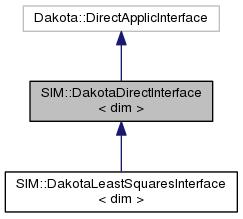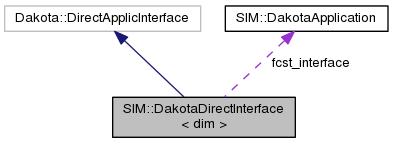This class is used to read the input file from Dakota in its original format, use this inforamtion to launch the fuel cell simulator and finally from the data from the fuel cell simulator, write the output to Dakota.
More...
#include <dakota_direct_interface.h>
|
| int | derived_map_ac (const Dakota::String &ac_name) |
| | Function called by DAKOTA's iterators in order to run the simulation code and assign the corresponding result values by using synchronize_variables(). More...
|
| |
| void | dakota_adopt_parameters (boost::shared_ptr< FuelCell::ApplicationCore::OptimizationBlockMatrixApplication< dim > > app_linear) |
| | Member function that is used to get the design variable names and values and assigns the values to the parameter handler object. More...
|
| |
| void | dakota_assign_results (const std::vector< double > &responses, const std::vector< std::vector< double > > &dresponses_dl) |
| | Member function that is used to assign the application responses and gradients to the result variables of DAKOTA. More...
|
| |
| void | dakota_assign_results (const std::vector< double > &responses) |
| | Member function that is used to assign the application responses to the result variables of DAKOTA. More...
|
| |
template<int dim>
class SIM::DakotaDirectInterface< dim >
This class is used to read the input file from Dakota in its original format, use this inforamtion to launch the fuel cell simulator and finally from the data from the fuel cell simulator, write the output to Dakota.
This application needs to be inherited from Dakota::DirectApplicInterface which belongs to the Dakota library.
These applications are selected in SimulatorBuilder<dim>::run_optimization() and they are assigned to Dakota in DakotaApplication::assign_interface(Dakota::DirectApplicInterface* optimization_interface)
For more information please visit the Dakota reference guide at http://dakota.sandia.gov/licensing/votd/html-dev/
- Author
- M. Krack, P. Dobson and M. Secanell, 2010-12
Default constructor for an object of this class.
Constructor for an object of this class. Links the Dakota database with the linear applications and the solver.
Member function that is used to get the design variable names and values and assigns the values to the parameter handler object.
template<int dim>
| void SIM::DakotaDirectInterface< dim >::dakota_assign_results |
( |
const std::vector< double > & |
responses, |
|
|
const std::vector< std::vector< double > > & |
dresponses_dl |
|
) |
| |
|
protected |
Member function that is used to assign the application responses and gradients to the result variables of DAKOTA.
Member function that is used to assign the application responses to the result variables of DAKOTA.
Function called by DAKOTA's iterators in order to run the simulation code and assign the corresponding result values by using synchronize_variables().
Data structure storing information to be shared between applications.
Object used to calculate the CPU and Run time for the optimization evaluation.
Pointer to the DakotaApplication object, so that the design variables can be accessed with synchronize_variables().
Number of design variables.
Member that stores the name of the design variables.
Member that stores the name of the responses.
Pointer to the Parameter Handler object.
Pointer to the problem description data base.
Pointer to the SimulationSelector object which gives access to the file names and selector functions for linear applications (CATHODE MODEL, NON-ISOTHERMAL CATHODE MODEL, MEA Model,...), newton solves (NewtonBasic, Newton3ppC, ...), and the meshing method that you would like to use (Adaptive Refinement).
The documentation for this class was generated from the following file:


 1.8.5
1.8.5